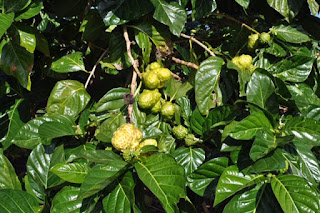Honeybee Love: The Role of Bees on a Noni Farm
The role of bees on a noni farm is a little different than on other types of farms. This is because MorindaCitrifolia (aka noni) is a very unusual plant. It’s full of amazing beneficial compounds, grows and fruits year-round, and it also reproduces in a very unusual way.
You probably know that most plants have to exchange pollen in order to reproduce. This can be done by the wind or by pollinator animals, such as bees. When bees crawl into flowers in search of pollen and nectar, a lot of pollen sticks to their hairy bodies. They then crawl into another flower, and the pollen of the two flowers mixes.
But noni trees work a little differently. Noni trees make a fruit first and then the flowers come out of the fruit after the tree has made a fruit. If you look at a photo of a mature white Noni fruit, you will see many, many brown spots where a flower has been attached (75- 100 flowers per fruit).The flowers have nothing to do with pollination and making a fruit which means that they don’t actually need bees to pollinate them at all! And yet, there are honeybees landing on the noni blossoms all the time. What’s going on? We have over 45 Bee hives on our organic farm. Bees love our Noni and we love our bees.
Bee Basics
Bees need pollen and nectar for food and honey making. That’s why they fly from flower to flower. Usually, the flowers that require bee pollination have evolved to attract bees, and bees tend to leave alone the flowers that don’t need them.
So why would noni blossoms have evolved to attract bees? There must be some kind of mutual gain. Obviously the bee can still get nectar and pollen from the flower, but what does the noni plant get in return?
Bees and Noni
Another thing that makes noni so unusual is that flowers only develop after the fruit has begun to form. There hasn’t been a lot of research done on why and how exactly this happens.
But we do know that it means that bees are visiting flowers once the fruit is already formed—pretty unique in the plant world. So what are they doing there, other than gathering nectar?
The answer is, we’re not really sure. MorindaCitrifoliais still very under-researched. But ethno botanists who have visited our farm to research Noni believe that bees contribute to the fruit in a very special way. They hypothesize that many of the many beneficial compounds found in the fruit actually come from bees and pollen entering the flowers that grow on the noni fruit.
If more conclusive research comes in about this, we’ll let you know. For now, it’s one of those amazing mysteries of nature.
Whether the ethno biologists are right or not, we love that honeybees visit our noni blossoms. We’re committed to supporting pollinators, and bees are particularly important. They pollinate many of the other local flowering plants, both decorative and edible. According to some estimates, bees are responsible for pollinating more than 90 flowering food crops, translating to 80% of the food in grocery stores. Without bees, those plants would die, and our food system would be hugely impacted.
The Plight of Bees
Bees are also of special importance because they are at risk worldwide. Varroa mites and Colony Collapse Disorder (CCD) have led to mass bee deaths, especially in the United States and Europe. Many scientists and environmentalists have dedicated themselves to finding out why this is happening.
Many experts blame the ever-increasing usage of commercial pesticides in industrial agriculture. They believe these pesticides are dampening bees’ immune systems, as they are exposed to small amounts throughout their lifetimes.
Bees on Kauai
This makes bees on Kauai extra-important, because the bees on our island don’t show many of the signs of a depressed immune system that other bees show worldwide. There are also no varroa mites on the island, and no known cases of CCD.
Kauai is a great environment for bees. They can fly and forage year-round, and there’s no winter season to put stress on them. Bees have flourished on Kauai since they were brought to the island in the late 1890s for commercial honey-making.
Today, even most commercial beehives on Kauai are more wild than in the rest of the United States. Bees roam the island, pollinating food and flower crops that are a major source of income for the island.
We need to do everything we can to support Kauai’s honeybees, and protect them from being harmed by pesticides or infected with varroa mites. Our bees might even hold some answers that can save bee populations elsewhere.
Bees Love Organic
For obvious reasons, organic agriculture is ideal for bees. Organic agriculture uses no pesticides, which means that when bees visit the flowers of organically-grown plants, they aren’t consuming tiny amounts of poison.
That’s why our noni trees are a great source of nectar and pollen for honeybees. We’ve been growing noni trees totally organically for over 30 years, and we don’t use any pesticides, chemical fertilizers, or herbicides that could harm bees.
We think that’s part of the reason so many honeybees love our noni trees, as well as the other flowering plants we grow on our land. We provide a safe, diverse menu for our bee visitors, and we encourage others to do the same. The more farmers that grow organic, the happier and safer bees are.

No comments:
Post a Comment